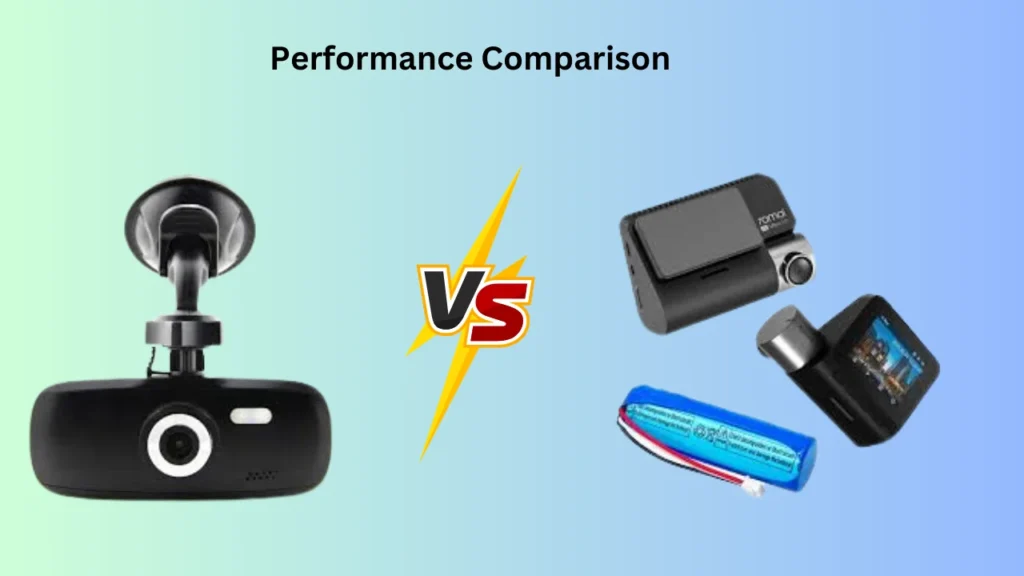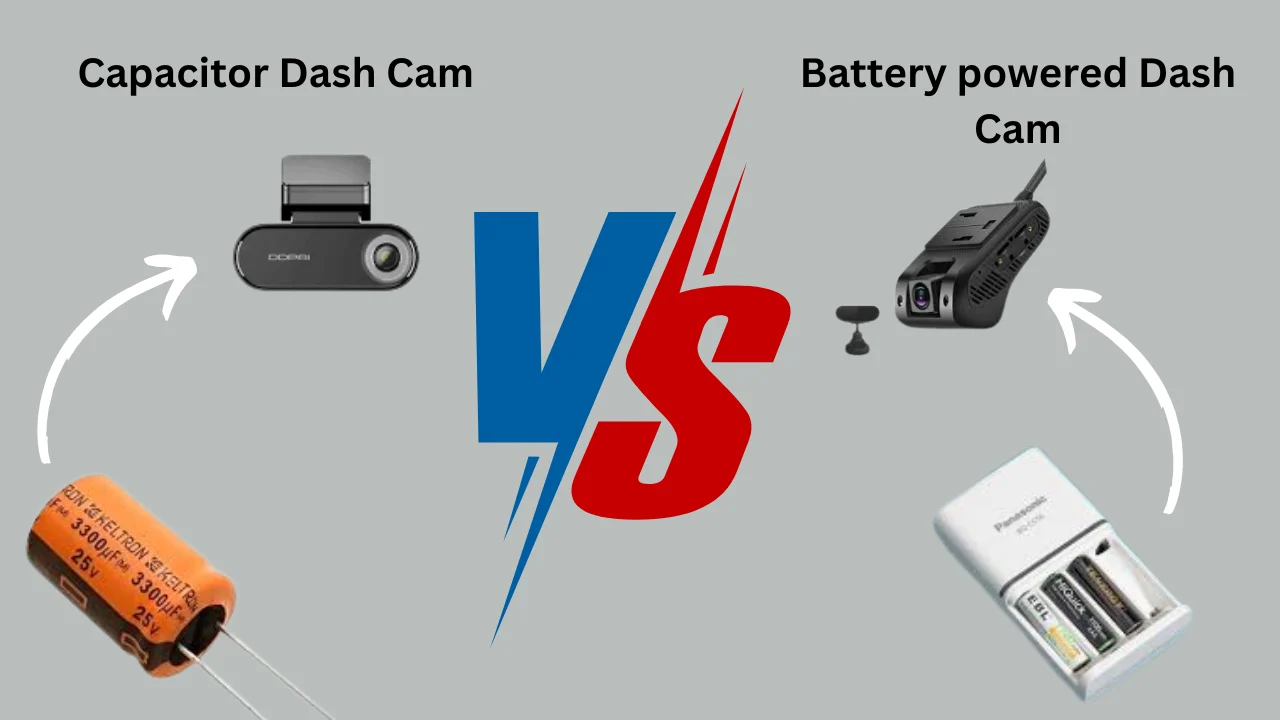When it comes to choosing the right power source for your dash cam, it’s important to compare a capacitor dash cam vs battery. Capacitors are known for their durability, lasting around 10 years. In contrast, battery-powered dash cams usually need replacing within 1-2 years. The 30fps vs 60fps Dash Cam article discusses the importance of frame rates in dash cams and how they impact video clarity and smoothness.
Personally, I’ve found that capacitors offer better performance in extreme temperatures. They can handle temperatures ranging from -40°C to 70°C. Batteries, on the other hand, tend to fail in temperatures above 40°C, making capacitors a more reliable option.
How does the power source affect the dash cam’s recording duration after an incident?
The power source of a dash cam plays a crucial role in determining its recording duration after an incident. Capacitor-powered dash cams are designed to quickly store footage during an event but typically only provide enough power to save a few seconds of video afterward. This is because capacitors store less energy and discharge quickly.
On the other hand, battery-powered dash cams can continue recording for several minutes after an incident due to the larger energy storage capacity of batteries. This extended recording time can be helpful in capturing more detailed evidence or events that occur after the initial impact. If you’re wondering about the image quality difference, the 1080p vs 1440p Dash Cam article explains the advantages of each resolution in dash cams.
Comparison Table
Capacitor Dash Cam vs Battery Differences
Dash Cam Power Sources

When it comes to dash cams, the two main power sources are capacitors and batteries. Both have their pros and cons, which I’ll dive into so you can make an informed decision based on your needs.
Capacitors
Capacitors are like mini powerhouses that provide quick bursts of energy to your dash cam. They typically have a lifespan of over 10 years and can handle extreme temperatures, from -40°C to 70°C. Unlike batteries, capacitors won’t degrade as quickly over time.
The main advantage of a capacitor-powered dash cam is its durability. While a battery can lose up to 20% of its performance after just a year of use, a capacitor can last much longer without significant wear and tear. Plus, capacitors charge rapidly, ensuring that your dash cam is always ready to roll.
However, the catch with capacitors is that they don’t store energy for long periods. So, while they charge quickly, they’re not ideal for continuous power storage. You’ll need your car to be running or have a constant power supply for them to work efficiently.
Batteries
On the other hand, batteries are more common and widely used in many dash cams. They have a higher energy storage capacity, allowing them to work even when the car is turned off. Depending on the model, a battery can last anywhere from 1 to 2 years before showing signs of degradation, especially in hot climates.
Batteries are great for those who need their dash cams to keep recording after turning off the car. However, they can’t handle extreme temperatures as well as capacitors. In hot weather, your battery could lose up to 30% of its capacity in just six months. This means more frequent replacements, which can get costly in the long run.
Another downside of batteries is that they take longer to charge, typically around 4-6 hours for a full charge. So, if you’re in a rush, you may need to wait before you’re good to go.
Performance Comparison

In this section, we’ll dive into how capacitors and batteries perform in different key areas, such as temperature resistance, durability, and charging capabilities. These factors will help you decide which option is best suited for your needs.
Temperature Resistance
Capacitors are great at handling extreme temperatures, ranging from -40°C to 70°C. This means they won’t fail when exposed to the heat of a car’s interior during summer or freezing winter temperatures. On the other hand, batteries struggle with such conditions and may degrade faster, especially if temperatures exceed 40°C, shortening their lifespan by up to 30%.
Durability and Lifespan
When it comes to durability, capacitors last a long time. They can handle over 10 years of use without significant performance drops, making them the more reliable option for the long haul. Meanwhile, batteries typically last only 1-2 years before showing signs of wear and needing a replacement, especially under high heat.
Charging and Discharging
Capacitors charge and discharge quickly, allowing your dash cam to be up and running in no time. It takes around 30 seconds to fully charge, providing a quick recovery from power loss. In contrast, batteries take longer, sometimes up to 3-4 hours for a full charge, which can be inconvenient if you’re in a rush. The RedTiger vs Rove Dash Cam article helps you decide between two top contenders by comparing their video quality, features, and value for money.
Safety Considerations

When choosing a dash cam, safety is a top priority. Let’s dive into how capacitors and batteries stack up when it comes to safety.
Capacitors
Capacitors have a significant advantage when it comes to safety. Unlike batteries, they don’t pose the same risks of overheating or leakage. Since capacitors can withstand temperatures ranging from -40°C to 70°C, they are far less likely to swell, burst, or cause any hazardous situations.
Batteries
Batteries, while cheaper, can be a bit more dangerous, especially in hot climates. In extreme conditions, batteries can overheat, swell, or even leak, potentially damaging your vehicle. The risk of explosion or leakage is much higher when the temperature exceeds 40°C, which can happen in summer months or while parked in direct sunlight.
How It Affects You
If you live in a hot region or leave your car parked for long hours, you might want to consider a capacitor-powered dash cam. With a capacitor, you don’t have to worry about the safety concerns that come with batteries. Plus, capacitors are designed to last longer, meaning you’ll get consistent safety over time.
Cost Analysis
When it comes to dash cams, price is a big factor, and the cost of the power source—whether it’s a capacitor or a battery—can affect your overall investment. Let’s dive into how these two options stack up financially and what that means for your wallet.
Capacitors
Capacitor-powered dash cams typically come with a higher initial price tag, usually around $50-$100 more than their battery counterparts. But here’s the thing—because capacitors last much longer (up to 10 years, compared to batteries’ 1-2 years), the cost ends up being more spread out, making them more cost-effective over time.
Batteries
Battery-powered dash cams are often cheaper upfront, usually costing between $50-$100 less than models with capacitors. However, the maintenance costs start adding up, as you may need to replace the battery after 1-2 years, leading to additional expenses that can easily exceed the initial savings.
Long-Term Value
When comparing the long-term value, capacitors are the better choice if you’re thinking of keeping your dash cam for many years. The upfront price may seem steep, but considering the reduced need for replacements, it’s an investment that’ll pay off in the long run, potentially saving you hundreds over time. Learn about the differences between the Garmin Dash Cam Mini 3 vs Mini 2 in terms of design, functionality, and camera quality.
Choosing the Right Dash Cam for Your Needs
Choosing between a capacitor or battery-powered dash cam is more than just a decision about power. It involves considering how often and where you drive, your budget, and how long you need your dash cam to last.
Climate and Temperature Conditions
If you live in a place where temperatures can soar past 40°C in the summer, a capacitor-powered dash cam might be your best bet. Capacitors handle heat much better than batteries, withstanding up to 70°C without affecting performance. On the other hand, battery-powered cams struggle in these conditions, often leading to a reduced lifespan or malfunction.
Driving Habits and Usage
For daily drivers like myself, a capacitor is a solid choice, especially if I’m in and out of the car frequently. Capacitors can rapidly charge and discharge, making them perfect for situations where the car isn’t constantly running. Battery-powered dash cams, on the other hand, may require more maintenance and could lose charge over time.
Budget Considerations
Let’s face it, cost matters. If you’re on a tight budget, you might lean toward battery-powered dash cams because they come at a lower price. You can find a good battery-powered dash cam for around $50, whereas capacitor-powered models often start around $100 or more. But remember, you may end up paying for that cheaper choice in the long run with more frequent replacements.
Desired Lifespan and Reliability
I prefer reliability, and in this case, capacitors shine. They’re built to last for 10+ years, even with heavy usage, while battery-powered dash cams generally have a 1-2 year lifespan. If you want a dash cam that’s going to stand the test of time without needing constant replacements, a capacitor-powered model might be the way to go. The Garmin Dash Cam 47 vs 57 article compares two popular Garmin dash cams, highlighting their key differences in features and performance.
Final Words
When deciding between a capacitor dash cam vs battery, I’ve found that capacitors excel in durability. With a lifespan of 10 years, they outperform batteries, which typically last just 1-2 years in high temperatures. Capacitors also handle extreme weather better, especially in places like Arizona, where temperatures can reach 70°C.
For those on a budget, battery-powered dash cams might seem appealing due to their lower initial cost. However, considering the safety and longevity, capacitor dash cams offer better long-term value.




